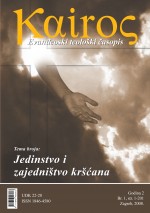
Unity and Fellowship of Christians from a Pentecostal Perspective
Jedinstvo i zajedništvo kršćana iz pentekostne perspektive
Beginning with the historical development and the specification of the Pentecostal-Charismatic Movement, the first part of this article deals with the applied biblical ecclesiology of independent churches. Then it explains the role of the Holy Spirit in realizing and maintaining the unity of Christians. The unity of Christians does not require or assume uniformity of practice nor complete unanimity of teaching. Pentecostal churches excel in the various ways of worship and organizational structures, even in variety of teachings. The challenge for Christians today is living in unity without demanding that the worship, structure and the theology of the churches be more uniform than those of the New Testament churches. Jesus Christ lives within Christians through the Holy Spirit dwelling in them, and Christians live in fellowship with one another by the Holy Spirit. While realizing God’s will, the Holy Spirit creates different fellowships with Christ’s disciples, binds them with one another and as a church. Most Pentecostals in Croatia do not support the ecumenical movement because they consider it to be founded not on biblical, but rather, on humanistic principles. They do believe in the spiritual unity of Christians and support fellowship with all the biblically founded churches and communities.
More...
